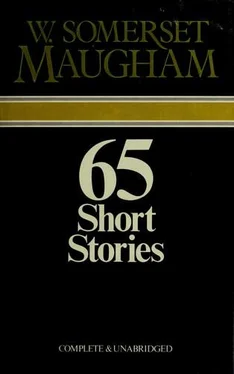Somerset Maugham - Sixty-Five Short Stories
Здесь есть возможность читать онлайн «Somerset Maugham - Sixty-Five Short Stories» весь текст электронной книги совершенно бесплатно (целиком полную версию без сокращений). В некоторых случаях можно слушать аудио, скачать через торрент в формате fb2 и присутствует краткое содержание. Жанр: Фантастика и фэнтези, на русском языке. Описание произведения, (предисловие) а так же отзывы посетителей доступны на портале библиотеки ЛибКат.
- Название:Sixty-Five Short Stories
- Автор:
- Жанр:
- Год:неизвестен
- ISBN:нет данных
- Рейтинг книги:4.5 / 5. Голосов: 2
-
Избранное:Добавить в избранное
- Отзывы:
-
Ваша оценка:
- 100
- 1
- 2
- 3
- 4
- 5
Sixty-Five Short Stories: краткое содержание, описание и аннотация
Предлагаем к чтению аннотацию, описание, краткое содержание или предисловие (зависит от того, что написал сам автор книги «Sixty-Five Short Stories»). Если вы не нашли необходимую информацию о книге — напишите в комментариях, мы постараемся отыскать её.
Sixty-Five Short Stories — читать онлайн бесплатно полную книгу (весь текст) целиком
Ниже представлен текст книги, разбитый по страницам. Система сохранения места последней прочитанной страницы, позволяет с удобством читать онлайн бесплатно книгу «Sixty-Five Short Stories», без необходимости каждый раз заново искать на чём Вы остановились. Поставьте закладку, и сможете в любой момент перейти на страницу, на которой закончили чтение.
Интервал:
Закладка:
'I read a lot of Conrad.'
'For pleasure or to improve your mind?'
'Both. I admire him awfully.'
Darya threw up her arms in an extravagant gesture of protest.
'That Pole,' she cried. 'How can you English ever have let yourselves be taken in by that wordy mountebank? He was all the superficiality of his countrymen. That stream of words, those involved sentences, the showy rhetoric, that affection of profundity: when you get through all that to the thought at the bottom, what do you find but a trivial commonplace? He was like a second-rate actor who puts on a romantic dress and declaims a play by Victor Hugo. For five minutes you say this is heroic, and then your whole soul revolts and you cry, no, this is false, false, false.'
She spoke with a passion that Neil had never known anyone show when speaking of art or literature. Her cheeks, usually colourless, flushed and her pale eyes glowed.
'There's no one who got atmosphere like Conrad,' said Neil. 'I can smell and see and feel the East when I read him.'
'Nonsense. What do you know about the East? Everyone will tell you that he made the grossest blunders. Ask Angus.'
'Of course he was not always accurate,' said Munro, in his measured, reflective way. 'The Borneo he described is not the Borneo we know. He saw it from the deck of a merchant-vessel and he was not an acute observer even of what he saw. But does it matter? I don't know why fiction should be hampered by fact. I don't think it's a mean achievement to have created a country, a dark, sinister, romantic, and heroic country of the soul.'
'You're a sentimentalist, my poor Angus.' And then again to Neil: 'You must read Turgenev, you must read Tolstoy, you must read Dostoyevsky.'
Neil did not in the least know what to make of Darya Munro. She skipped over the first stages of acquaintance and treated him at once like someone she had known intimately all her life. It puzzled him. It seemed so reckless. When he met anyone his own instinct was to go cautiously. He was amiable, but he did not like to step too far before he saw his way before him. He did not want to give anyone his confidence before he thought himself justified. But with Darya you could not help yourself; she forced your confidence. She poured out the feelings and thoughts that most people keep to themselves like a prodigal flinging gold pieces to a scrambling crowd. She did not talk, she did not act, like anyone he had ever known. She did not mind what she said. She would speak of the natural functions of the human animal in a way that brought the blushes coursing to his cheeks. They excited her ridicule.
'Oh, what a prig you are! What is there indecent in it? When I'm going to take a purge, why shouldn't I say so, and when I think you want one, why shouldn't I tell you?'
'Theoretically I dare say you're right,' said Neil, always judicious and reasonable.
She made him tell her of his father and mother, his brothers, his life at school and at the university. She told him about herself. Her father was a general killed in the war and her mother a Princess Lutchkov. They were in Eastern Russia when the Bolsheviks seized power, and fled to Yokohama. Here they had subsisted miserably on the sale of their jewels and such objects of art as they had been able to save, and here she married a fellow-exile. She was unhappy with him and in two years divorced him. Her mother died and, penniless, she was driven to earn her living as best she could. She was employed by an American relief organization. She taught in a mission school. She worked in a hospital. She made Neil's blood boil, and at the same time embarrassed him very much, when she spoke of the men who tried to take advantage of her defencelessness and her poverty. She spared him no details.
'Brutes,' he said.
'Oh, all men are like that,' she replied, with a shrug of her shoulders.
She told him how once she protected her virtue at the point of her revolver.
'I swore I'd kill him if he took another step, and if he had I'd have shot him like a dog.'
'Gosh!' said Neil.
It was at Yokohama that she met Angus. He was spending his leave in Japan. She was captivated by his straightforwardness, the decency which was so obvious in him, his tenderness and his consideration. He was not a business man; he was a scientist, and science is milk-brother to art. He offered her peace. He offered her security. And she was tired ofJapan. Borneo was a land of mystery. They had been married for five years.
She gave Neil the Russian novelists to read. She gave him Fathers and Sons, Anna Karenina, and The Brothers Karamazov.
'Those are the three peaks of our literature. Read them. They are the greatest novels the world has ever seen.'
Like many of her countrymen she talked as though no other literature counted, and as though a few novels and stories, some indifferent poetry, and half a dozen good plays had made whatever else the world has produced negligible. Neil was fascinated and overwhelmed.
'You're rather like Alyosha yourself, Neil,' she said, looking at him with eyes that were now so soft and tender, 'an Alyosha with a Scotch dourness, suspicious and prudent, that will not let the soul in you, the spiritual beauty, come out.'
'I'm not a bit like Alyosha,' he answered self-consciously.
'You don't know what you're like. You don't know anything about yourself. Why are you a naturalist? Is it for money? You could have made much more money by going into your uncle's office in Glasgow. I feel in you something strange and unearthly. I could bow down at your feet as Father Zossima did to Dimitri.'
'Please don't,' he said, smiling, but flushing a little too.
But the novels he read made her seem a little less strange to him. They gave her an environment and he recognized in her traits which, however unusual in the women he knew in Scotland, his mother and the daughters of his uncle in Glasgow, were common to many of the characters in Russian fiction. He no longer wondered that she should like to sit up so late, drinking innumerable cups of tea, and lie on the sofa nearly all day long reading and incessantly smoking cigarettes. She could do nothing at all for days on end without being bored. She had a curious mixture of languor and zest. She often said, with a shrug of her shoulders, that she was an Oriental, and a European only by chance. She had a feline grace that indeed suggested the Oriental. She was immensely untidy and it did not seem to affect her that cigarette-ends, old papers, and empty tins should lie about their living-room. But he thought she had something of Anna Karenina in her and he transferred to her the sympathy he felt for that pathetic creature. He understood her arrogance. It was not unnatural that she despised the women of the community, whose acquaintance little by little he made; they were commonplace; her mind was quicker than theirs, she had a wider culture, and she had above all a sort of tremulous sensitiveness that made them extraordinarily colourless. She certainly took no pains to conciliate them. Though at home she slopped about in a sarong and baju, when she and Angus went out to dinner she dressed with a splendour that was somewhat out of place. She liked to display her ample bosom and her shapely back. She painted her cheeks and made up her eyes like an actress for the footlights. Though it made Neil angry to see the amused or outraged glances that her appearance provoked, he could not in his heart but think it a pity that she should make such an object of herself. She looked grand, of course, but if you hadn't known who she was you would have thought she wasn't respectable. There were things about her that he could never get over. She had an enormous appetite and it fashed him that she ate more than he and Angus together. He could never quite get used to the bluntness with which she discussed sexual matters. She took it for granted that at home and in Edinburgh he had had affairs with a host of women. She pressed him for details of his adventures. His Scotch pawkiness helped him to parry her thrusts and he evaded her questions with native caution. She laughed at his reticence.
Читать дальшеИнтервал:
Закладка:
Похожие книги на «Sixty-Five Short Stories»
Представляем Вашему вниманию похожие книги на «Sixty-Five Short Stories» списком для выбора. Мы отобрали схожую по названию и смыслу литературу в надежде предоставить читателям больше вариантов отыскать новые, интересные, ещё непрочитанные произведения.
Обсуждение, отзывы о книге «Sixty-Five Short Stories» и просто собственные мнения читателей. Оставьте ваши комментарии, напишите, что Вы думаете о произведении, его смысле или главных героях. Укажите что конкретно понравилось, а что нет, и почему Вы так считаете.









